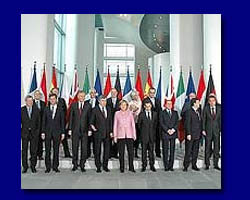World leaders commit to future G20, financial reforms
 Pittsburgh, Pennsylvania - The Group of 20 (G20) countries was turned into the world's top economic forum on Friday as leaders agreed to measures to keep the global economic recovery on track while implementing far-reaching financial-market reforms.
Pittsburgh, Pennsylvania - The Group of 20 (G20) countries was turned into the world's top economic forum on Friday as leaders agreed to measures to keep the global economic recovery on track while implementing far-reaching financial-market reforms.
Hosted by US President Barack Obama, the G20 summit offered emerging giants like China, India and Brazil a major victory by giving them a seat at the most important table in future global economic talks.
"We have bought the global economy back from the brink," Obama told a press conference at the end of the two-day summit in Pittsburgh. "We have laid the groundwork for a sustained recovery."
The G20 summit represents the third time meeting of the group's leaders since the world economy lurched into crisis in September 2008 after the collapse of the US investment bank Lehman Brothers.
Representing about 85 per cent of global economic output, the G20 includes leading industrial countries such as Germany, Canada and Japan along with the world's emerging powerhouse economies including China, India and Brazil.
However, the G20 summit was overshadowed by Iran's admission that it had a second nuclear facility, with Obama joining British Prime Minister Gordon Brown and French President Nicolas Sarkozy in roundly condemning Tehran.
The world community had reacted to the news of Iran's second reactor with "an unprecedented display of unity," Obama said.
In a joint statement following the summit, G20 leaders pledged to set up a framework that would allow them to keep tabs on each other's economic policies and prevent a future financial crisis from plunging the world economy into recession.
"We will work together to ensure that our fiscal, monetary, trade and structural policies are collectively consistent with more sustainable and balanced trajectories of growth," the statement read.
Despite signs of the recession coming to an end, the G20 leaders said it was too early to step back from massive government stimulus measures and warned that recovery remains fragile. They did agree to develop "exit strategies" in coming months.
In addition to imposing tougher controls on banks, the leaders smoothed over divisions on bankers' bonuses, agreeing to a plan that aims to make executive pay dependent on performance.
This, they hope, will bring to an end the kind of excessive risk- taking that almost triggered a meltdown a year ago on Wall Street and that sent global economic growth into a downward spiral. Financial firms failing to comply could face penalties.
German Chancellor Angela Merkel, who faces an election on Sunday, joined other European leaders in spearheading the push to clamp down on excessive bonus payments. She said the deals hammered out in Pittsburgh should give people confidence that "such a crisis will never happen again."
As the leaders met in the heavily secured downtown convention centre, thousands of protesters took to the streets of Pittsburgh to voice their dissent with the powerful governments holding sway over the world's economy.
The streets were lined with hundreds of police wearing riot gear to fend off the protesters, mostly from nearby universities.
"If they had been paying attention to what was taking place inside the summit itself, what they would have heard was a strong recognition from the most diverse collection of leaders in history that it is important to make sure that the market is working for ordinary people," Obama told reporters.
Welcoming the G20 decision to transform itself into the premier international economic forum, Chinese President Hu Jintao said it was now up to world leaders to "make full use of the G20 platform" to tackle the world's toughest economic problems and promote recovery.
The G20 will now supersede the Group of Eight (G8), which was formed in 1975 and now includes the United States, France, Italy, Canada, Japan, Germany, Britain and Russia.
The G8, however, will continue to meet but with a focus on major international security issues.
G20 leaders tentatively agreed to moves to boost the voting powers of emerging economies on the boards of key global financial institutions including the International Monetary Fund.
Indian Prime Minister Manmohan Singh told the summit it was critical for the world's advanced nations to continue measures to help developing economies emerge from the ongoing financial crisis.
"We must take steps to counter these developments and restore the momentum of growth in the developing world," he said.
In the build up to December's Copenhagen summit on global climate change, G20 leaders signed off on a plan to phase out 300 billion dollars worth of fossil-fuel subsidies as part of a plan to reduce global warming.
Obama said the plan is designed to help move away from polluting sources of energy and bring the world into the "21st-century energy economy." (dpa)